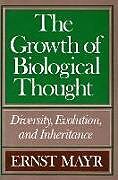The Growth of Biological Thought
Einband:
Kartonierter Einband
EAN:
9780674364462
Untertitel:
Diversity, Evolution, and Inheritance
Genre:
Biologie
Autor:
Ernst Mayr
Herausgeber:
Harvard University Press
Auflage:
Repr.
Anzahl Seiten:
974
Erscheinungsdatum:
22.01.1985
ISBN:
978-0-674-36446-2
Klappentext No one in this century can speak with greater authority on the progress of ideas in biology than Ernst Mayr. And no book has ever established the life sciences so firmly in the mainstream of Western intellectual history as "The Growth of Biological Thought." Ten years in preparation, this is a work of epic proportions, tracing the development of the major problems of biology from the earliest attempts to find order in the diversity of life, to modern research into the mechanisms of gene transmission. Zusammenfassung No one in this century can speak with greater authority on the progress of ideas in biology than Ernst Mayr. Ten years in preparation! this is a work of epic proportions! tracing the development of major problems of biology from the earliest attempts to find order in the diversity of life! to modern research into mechanisms of gene transmission.
Autorentext
Ernst Mayr
Klappentext
No book has ever established the life sciences so firmly in the mainstream of Western intellectual history as 'The Growth of Biological Thought.' Ten years in preparation, this is a work of epic proportions, tracing the development of the major problems of biology, from the earliest attempts to find order in the diversity of life to modern research into the mechanisms of gene transmission.
Inhalt
1 Introduction: How to write history of biology Subjectivity and bias Why study the history of biology? 2 The place of biology in the sciences and its conceptual structure The nature of science Method in science The position of biology within the sciences How and why is biology different? Special characteristics of living organisms Reduction and biology Emergence The conceptual structure of biology A new philosophy of biology 3 The changing intellectual milieu of biology Antiquity The Christian world picture The Renaissance The discovery of diversity Biology in the Enlightenment The rise of science from the seventeenth to the nineteenth century Divisive developments in the nineteenth century Biology in the twentieth century Major periods in the history of biology Biology and philosophy Biology today PART I DIVERSITY OF LIFE 4 Macrotaxonomy, the science of classifying Aristotle The classification of plants by the ancients and the herbalists Downward classification by logical division Pre-Linnaean zoologists Carl Linnaeus Buffon A new start in animal classification Taxonomic characters Upward classification by empirical grouping Transition period (1758-1859) Hierarchical classifications 5 Grouping according to common ancestry The decline of macrotaxonomic research Numerical phenetics Cladistics The traditional or evolutionary methodology New taxonomic characters Facilitation of information retrieval The study of diversity 6 Microtaxonomy, the science of species Early species concepts The essentialist species concept The nominalistic species concept Darwin's species concept The rise of the biological species concept Applying the biological species concept to multidimensional species taxa The significance of species in biology PART II EVOLUTION 7 Origins without evolution The coming of evolutionism The French Enlightenment 8 Evolution before Darwin Lamarck Cuvier England Lyell and uniformitarianism Germany 9 Charles Darwin Darwin and evolution Alfred Russel Wallace The publication of the Origin 10 Darwin's evidence for evolution and common descent Common descent and the natural system Common descent and geographical distribution Morphology as evidence for evolution and common descent Embryology as evidence for evolution and common descent 11 The causation of evolution: natural selection The major components of the theory of natural selection The origin of the concept of natural selection The impact of the Darwinian revolution The resistance to natural selection Alternate evolutionary theories 12 Diversity and synthesis of evolutionary thought The growing split among the evolutionists Advances in evolutionary genetics Advances in evolutionary systematics The evolutionary synthesis 13 Post-synthesis developments Molecular biology Natural selection Unresolved issues in natural selection Modes of speciation Macroevolution The evolution of man Evolution in modern thought PART III VARIATION AND ITS INHERITANCE 14 Early theories and breeding experiments Theories of inheritance among the ancients Mendel's forerunners 15 Germ cells, vehicles of heredity The Schwann-Schleiden cell theory The meaning of sex and fertilization Chromosomes and their role 16 The nature of inheritance Darwin and variation August Weismann Hugo de Vries Gregor Mendel 17 The flowering of Mendelian genetics The rediscoverers of Mendel The classical period of Mendelian genetics The origin of new variation (mutation) The emergence of modern genetics The Sutton-Boveri chromosome theory Sex determination Morgan and the fly room Meiosis Morgan and the chromosome theory 18 Theories of the gene Competing theories of inheritance The Mendelian explanation of continuous variation 19 The chemical basis of inheritance The discovery of the double helix Genetics in modern thought 20 Epilogue: Toward a science of science Scientists and the scientific milieu The maturation of theories and concepts Impediments to the maturation of theories and concepts The sciences and the external milieu Progress in science Notes References Glossary Index

Leider konnten wir für diesen Artikel keine Preise ermitteln ...
billigbuch.ch sucht jetzt für Sie die besten Angebote ...
Die aktuellen Verkaufspreise von 6 Onlineshops werden in Realtime abgefragt.
Sie können das gewünschte Produkt anschliessend direkt beim Anbieter Ihrer Wahl bestellen.
Loading...
Die aktuellen Verkaufspreise von 6 Onlineshops werden in Realtime abgefragt.
Sie können das gewünschte Produkt anschliessend direkt beim Anbieter Ihrer Wahl bestellen.
| # | Onlineshop | Preis CHF | Versand CHF | Total CHF | ||
|---|---|---|---|---|---|---|
| 1 | Seller | 0.00 | 0.00 | 0.00 |
